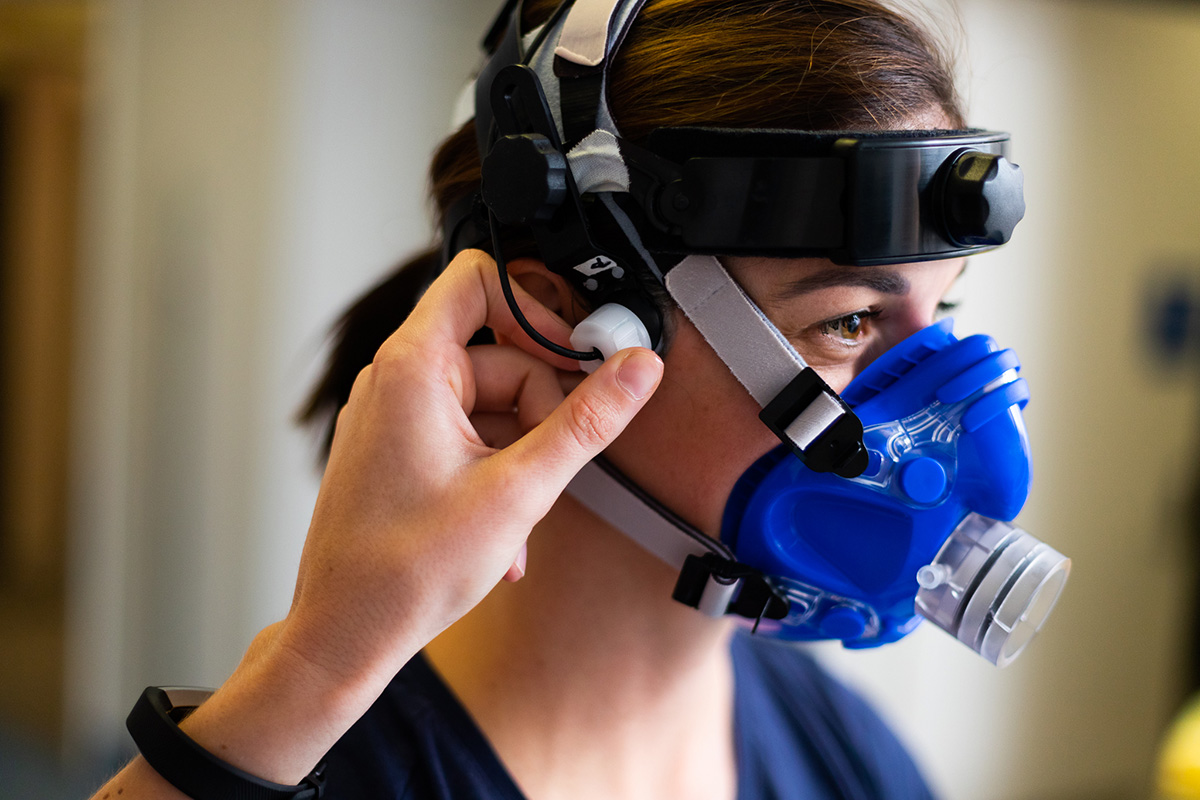Sport, Health & Wellbeing
First generation student with a firm focus on brain health
Vicki McCarthy spends a lot of her time in a lab, undertaking tests and collecting data for her PhD research — something she never thought she’d be doing.
She is the first in her family to study at university, following a passion and curiosity in cerebrovascular health – the health of blood vessels in the brain – and the potential relationship this may have with cognitive health, especially as we age.
Vicki’s journey to studying her PhD in the Active Brain research theme at UCRISE (University of Canberra Research Institute of Sport and Exercise) began with a love of sport as a child.
She played a variety of sports growing up, mainly hockey and touch football, and when deciding on opportunities after college, she chose to take this passion for sport and explore a career in the realm of exercise and health.
“I thought to myself, ‘If I can’t be an elite athlete, I can at least be part of that world and help other athletes achieve their goals’,” Vicki says.
Having enjoyed her exercise science units in high school, Vicki initially enrolled in a double degree in Exercise Science and Sports Management at UC.
As she learned and experienced more, her aspirations shifted from working in elite sport to improving the quality of life of individuals. One of her lecturers, and now current PhD supervisor, recommended she transfer to the Bachelor of Exercise Physiology and Rehabilitation course.
“Exercise Physiology [EP] embodies everything I want to achieve: it’s about assisting an individual in the community who, in most cases, does not have access to the knowledge or support that is present in elite level environments,” she says.
“I learned that not everyone has the same experience with sport and exercise growing up, and that everyone’s idea of normal physical movement or ability is different. For me, half of the fun is recognising this and working with the individual to find an intervention that fits their circumstances.”
Her placement in a clinic specialising in the use of exercise to support people living with neurological conditions ignited her passion for the area.
“It was incredibly rewarding to work with people recovering from strokes, patients with spinal cord injuries, and various neurological conditions,” Vicki says.
“You can have so much fun and their small wins, like holding themselves up unsupported or doing buttons up on their shirt, feel like the biggest achievements – and they are.”
After completing her undergraduate degree, Vicki expected she transition directly to the workforce – she never anticipated that further study was just around the corner.
“When there’s no one in your family that has gone through tertiary education, or if attending university is not a major goal in your family, you know you can get through the world without needing a degree.”
“When one of my supervisors asked me to consider honours, I had no idea what that meant – my Dad and I had to look it up.
“I remember Dad saying, ‘Well, it’s 12 months. If you hate it – in the scheme of a lifetime, 12 months is absolutely nothing’.”
Vicki undertook her honours degree with the Active Brain group in UCRISE, one of seven research themes within the Institute, which looked at how engaging in exercise and a cognitive task at the same time may affect blood flow in the brain.
Her honours research focused on changes that occur in adults aged 55-70 years. She measured the velocity of the blood flow in vessels leading to the frontal regions of the brain (where higher order thinking happens, such as memory) and the motor cortex (where voluntary movement is signalled). She placed an ultrasound probe (see below an explainer) on the participants’ temple while they exercised, both with and without a simultaneous cognitive task, to measure blood velocity.
COVID-19 interrupted her study, and it was converted into a pilot program to allow her to finish her honours degree on time.
Vicki’s honours project led to her developing a love for research and enrolling in a PhD – with her first study expanding on the initial pilot project. This expansion included both pre-middle-aged and older participants (aged 18-30 or 55-70 years) to observe whether age may change how cerebral blood flow responds to each condition.

One year in and still shaping the focus of her thesis, Vicki is preparing the second study of her PhD, starting in 2023, which will look at the health of the blood vessels in the brain. She will explore whether regular engagement in concurrent training (combining physical and brain training) can help maintain the health of blood vessels in the brain as we age, and how this may impact cognitive function.
“I've witnessed first-hand how cruel the end stages of dementia can be, so if I can help identify activities which may support brain health in the long-term, then I can implement these in my own life and in the lives of others,” she says.
Looking back on her studies to date, Vicki’s proud of ‘the girl from Tuggeranong’ who is the first in her family to study at university. She’s happy to prove there’s no specific ‘type’ of person to become a researcher.
“Some people might have a preconceived idea that you’ve got to be extremely intelligent or have other people in your family who have studied. What really matters is that you care about what you do and are interested, committed, and willing to put in the time and effort."
“That being said, I couldn’t have done this without the support of my family, friends, my supervisors, and colleagues. On the days I was struggling with study, my family would encourage me to get through and provide a lot of positivity and optimism,” she says.
Words by Kailey Tonini, images by Tyler Cherry.